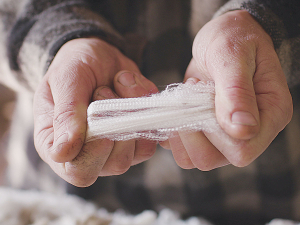Top wool advocate bales out
The conversion of productive farmland into trees has pretty much annihilated the wool industry.
 A petition calling on the Government to reverse its decision to fit rural schools with synthetic carpet was recently delivered to Parliament.
A petition calling on the Government to reverse its decision to fit rural schools with synthetic carpet was recently delivered to Parliament.
South Canterbury farmer Angela Blair has delivered a petition to Parliament calling on the Government to reverse its decision to fit rural schools with synthetic carpet.
Blair’s petition called on the Government to choose NZ made wool carpets for all the buildings it owns or has responsibility for carpeting.
In late August, she delivered the petition – signed by over 8000 people – to the National Party’s agriculture spokesman Todd McClay in Wellington.
Blair thanked all those people who had signed her petition – describing the support as amazing.
“To every one of you, each signature is a person standing up for our wonderful industry and our children’s future.”
Meanwhile, she also questioned why a similar petition in 2020, calling for all government and KiwiBuild buildings to be carpeted and insulated with NZ wool, had been ignored.
However, the Government has claimed an ‘administrative error’ meant the petition had not been presented to Parliament. A spokesperson promised it would be presented before the House rose for the upcoming election.
In July, the Ministry of Education announced, as part of its Nga Iti Kahurangi programme, that some 800 small and remote schools will get a US-made nylon carpet instead of NZ wool carpet.
Blair says this is a just another damaging example of the current Government not supporting NZ’s primary sector.
“Economically, it makes no sense to buy an internationally produced product and not support our own NZ businesses,” she explained. “In this time of recession and high inflation, it would have been a great opportunity for the Government to put its money where its mouth is and support our own economy.”
Blair says her protest was not just about farming.
“It’s about everyone: The shearers, the wool scourers, the factory producing the carpet, and the sales people. It’s about showing our children that NZ-made is the way of the future.”
Blair added there is also the safety aspect.
“In a fire, nylon carpet will burn like crude oil – fast and hot,” she explains.
“Wool is naturally fire resistant and can even self-extinguish.”
She says, environmentally, nylon is plastic.
“This is essentially importing tonnes and tonnes of single-use plastic into our country. Wool is a much more environmentally friendly option and when it is time to be replaced, wool carpet will biodegrade.”
Blair says wool is a natural insulator, naturally stain, odour and fire resistant.
“The Government should be modelling that wool as an environmental and safe choice can be better than the cheapest option. It’s about leading from the front.”
Registrations are now open for the 2026 Ruralco Golf Classic, with all proceeds from the event set to support the Mid Canterbury Rural Support Trust.
Mating wrapped up last month at the across-breed Beef Progeny Test on Pāmu’s Kepler Farm in Manapouri.
Libby Judson is a keeper of memories from an age gone by. Tim Fulton tells her story.
A New Zealand-first native tree study has highlighted the Bioeconomy Science Institute's position as a forestry research leader.
Hemp fibre processor Rubisco is relocating its core processing facility to Ashburton as part of a $20-$30 million expansion to leverage what it says is an accelerating global demand for sustainable and renewable fibres.
Tradition meets some of the latest in technology at the 2026 East Coast Farming Expo.